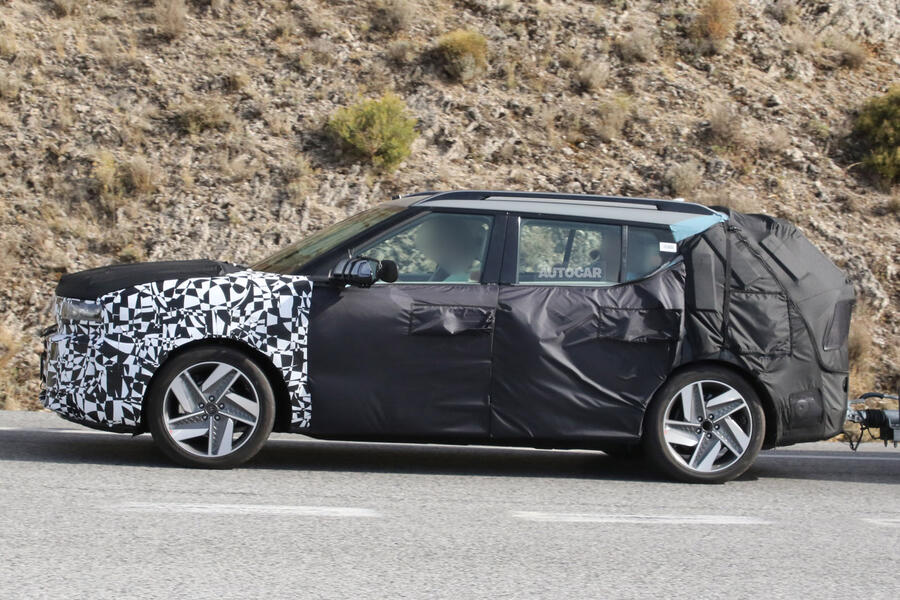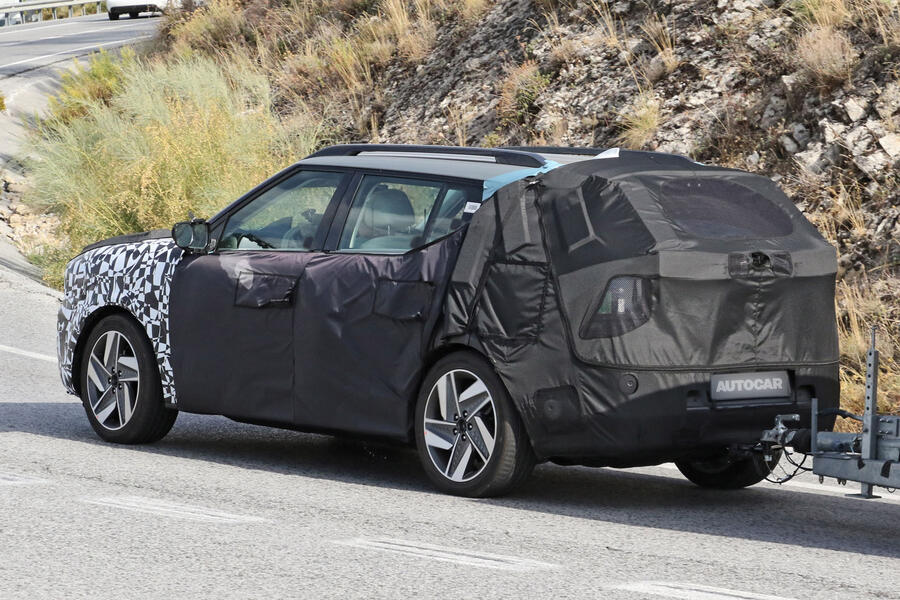# Unveiling the Next Generation of the Hyundai Nexo: A Commitment to Hydrogen Power

## A Bold Step Forward for Hyundai’s Hydrogen SUV
Hyundai is set to revolutionize its hydrogen-powered Nexo SUV with the introduction of a second-generation model, slated for release next year. This ambitious move underscores the company’s commitment to advancing fuel cell technology in the automotive sector.
## A Fresh Look for the New Nexo
Recent sightings of a prototype undergoing testing on European roads reveal a striking departure from the current Nexo’s design. The new model adopts a more angular and boxy aesthetic, reminiscent of the combustion-engine Santa Fe, featuring a pronounced front end and pixelated headlights. Unlike its larger counterpart, the new Nexo sits lower to the ground and forgoes the pronounced wheel arches.
While the prototype lacks rear light housings, other models spotted in Korea showcase unique plus-shaped light covers, hinting at a distinctive design language.
## Enhanced Performance and Range
Beneath its revamped exterior, the second-generation Nexo promises significant advancements in performance. The original model is equipped with three 52-liter hydrogen tanks, a 95kW fuel cell stack, and a 1.56kWh battery, offering a range of 414 miles per fill-up. The upcoming model will feature a new 100kW fuel cell stack that is approximately 30% smaller and boasts a lifespan that is 50-100% longer than its predecessor. Hyundai previously claimed that the original stack could last for 5,000 hours or 100,000 miles.
Additional enhancements, including a more efficient battery and motor, are expected to elevate the Nexo’s range to an impressive 500 miles, as reported by Korean media. This extended range is crucial, especially considering the limited availability of hydrogen refueling stations worldwide, with only six operational in the UK.
## Pricing and Market Viability
Affordability will play a pivotal role in the new Nexo’s market success. The current model’s price tag of £69,495 positions it as the most expensive vehicle in Hyundai’s lineup, which may hinder its appeal. Since its UK launch five years ago, fewer than 50 Nexos have been sold, with fewer than 10 units sold in the past two years.

## Hyundai’s Vision for Hydrogen Mobility
Despite these challenges, Hyundai remains optimistic about the Mk2 Nexo’s prospects. At a recent investor day, President and CEO Jaehoon Chang addressed the industry’s “chicken-and-egg issue,” drawing parallels to the early days of electric vehicles. He emphasized the need for investment and innovation to drive market adoption, stating, “We’re going to pioneer the uptake and lead the market.”
The second-generation Nexo is set to enter production next year, with hints of a road-ready version of the N Vision 74 coupé concept following closely behind. Hyundai is also exploring various hydrogen production methods, including the use of waste biomass and plastics.

## The Broader Hydrogen Landscape
Hyundai is not alone in its commitment to hydrogen technology. Toyota, a longstanding advocate for fuel cell electric vehicles (FCEVs), is currently testing a fleet of converted Hilux trucks in the UK and plans to participate in the future hydrogen-combustion class at the Le Mans 24 Hours. Meanwhile, BMW has announced plans to launch its first mass-produced FCEV in four years, signaling a growing demand for hydrogen-powered vehicles.
The Renault Group and Stellantis are also making strides in the FCEV market, with Renault set to unveil a new Master H2 van next year, featuring multiple body styles and a range of 435 miles between refuels.
## Conclusion
As the automotive industry continues to evolve, Hyundai’s second-generation Nexo represents a significant step towards a sustainable hydrogen future. With its innovative design, enhanced performance, and commitment to overcoming market challenges, the new Nexo is poised to make a lasting impact in the realm of fuel cell vehicles.